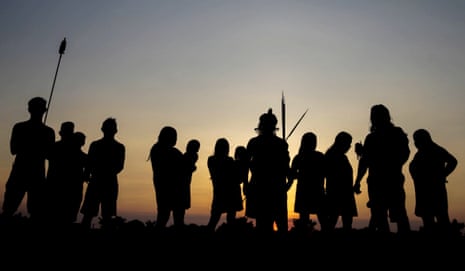Brazil’s last uncontacted tribes face “genocide” thanks to Jair Bolsonaro’s efforts to overturn existing policies to protect the country’s indigenous people, a group of leading experts have warned in an open letter to the far-right president.
The alert came after one of the country’s leading experts on isolated and recently contacted indigenous people was abruptly dismissed from Brazil’s indigenous affairs agency, with no reason given.
Bruno Pereira, who this year successfully led the biggest expedition in decades to contact a voluntarily isolated indigenous tribe, was fired last week. No reason was given, but the move has been interpreted as another step in Bolsonaro’s campaign to strip back protections from the country’s indigenous people.
Pereira’s sudden dismissal “represents another backwards step in the policy to protect isolated indigenous peoples”, the letter reads.
“It’s almost as if this government has a rule: to remove dedicated and competent people and put incompetents in their place,” said José Carlos Meirelles, a signatory of the letter who pioneered the “no contact” policy adopted by Brazil’s indigenous affairs agency, Funai.
Isolated or recently contacted indigenous people have little or no contact with the outside world, but are under increasing threat from illegal loggers, land-grabbers and miners who encroach on their territories.
Experts say that under Bolsonaro, violent land invasions have increased significantly. According to a recent report by Brazil’s Indigenous Missionary Council, 153 indigenous territories had been invaded since January – compared with 76 last year.
Last week, Bolsonaro’s mining minister, Bento Albuquerque, announced that draft legislation to allow mining and agriculture on indigenous lands should be ready later this month.
Contacted by the Guardian, Pereira said he could not comment on the reason for his dismissal as he didn’t have any information about it. He said Funai should explain why he was fired.
“Isolated indigenous people are extremely vulnerable. They don’t have political support; they don’t speak with journalists or other indigenous groups,” Pereira said.
Funai described Pereira’s dismissal as part of a management restructuring to “optimize work in progress”. His replacement, Paula Wolthers de Lorena Pires, is an anthropologist and indigenous specialist.
In April, Pereira led a mission to protect an isolated tribe from violent conflict with another group in the far-flung Javari Valley Reserve, near the border with Peru.
The region concentrates the largest number of isolated and recently contacted tribes in the world. In 2018, the Guardian accompanied Pereira on a 1,000km expedition to the region.
The vast, resource-rich region is swiftly becoming a new economic frontier for armed poachers, loggers, wildcat miners and drug traffickers.
Last month, a contractor who manned a National Indigenous Foundation base in the Javari Valley – which had been attacked several times – was murdered by gunmen on a motorbike in Tabatinga on the border with Colombia and Peru. Police are investigating the killing.
